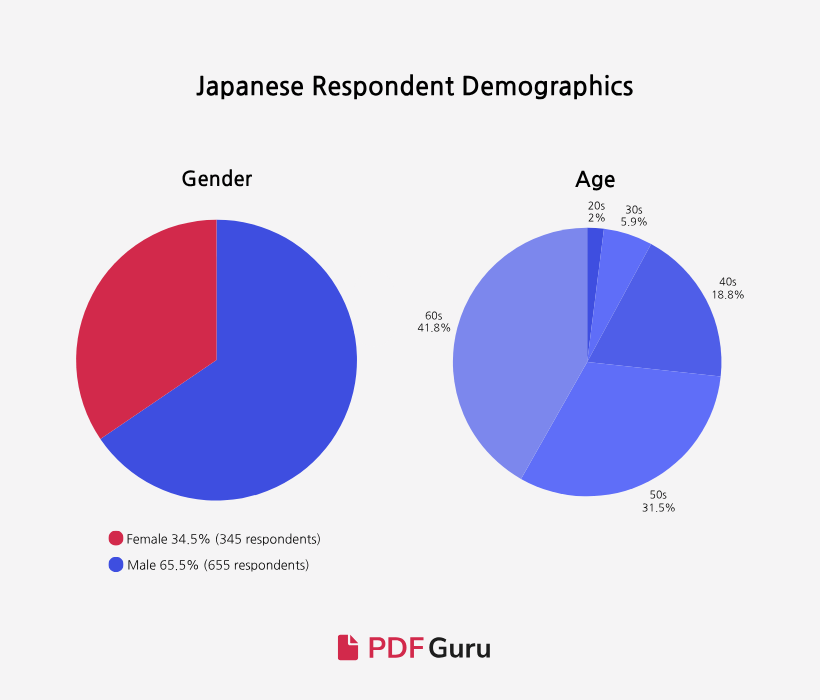Introduction
Since the pandemic, remote work has become widespread and continues to be a common way of working even after restrictions eased. As borders reopened, the idea of the 'digital nomad' – working from anywhere with just a laptop and an internet connection – has also gained popularity and captured global attention. This shift has redefined our understanding of employment, flexibility, and mobility.
Yet despite advanced electronic approval systems, cloud‑based collaboration tools, and mobile document‑management platforms in both Korea and Japan, strong cultural preferences for face‑to‑face meetings and rigid hierarchies have tempered the spread of remote work and nomadic practices. Although communication apps, file‑sharing services, PDF converter tools, and project‑management software are now ubiquitous, adoption still varies widely by industry and company size.
To explore these dynamics, PDF Guru conducted a survey of over 1,000 Japanese respondents earlier this year, followed by a July 2025 study of more than 500 Korean respondents. The surveys examined perceptions of the digital‑nomad lifestyle, the impacts of remote work, and the obstacles faced by respondents. The results reveal striking contrasts: Koreans stand out for their enthusiasm – over 30 % describe the lifestyle as ‘exciting and modern’ – and for prioritizing cost savings and global opportunities, while Japanese respondents tend to be more cautious or indifferent. In the following analysis, we’ll dive into how workers in each market view remote work and digital nomadism, the barriers they encounter, and what these insights mean for service providers looking to support this growing trend.
Key Findings
Stronger Enthusiasm in Korea
31.4 % of Koreans describe the digital‑nomad lifestyle as ‘exciting and modern,’ over four times Japan’s 7.7 %.
Economic Incentives Drive Adoption
While 37.8 % of Koreans point to cost savings on commuting and office expenses as the top benefit of location‑independent work, 16.7% say they don’t see any particular advantages.
In Japan, responses are more divided: 27.8 % see ‘no particular advantage,’ and 25.9 % highlight improved work-life balance.
Global Opportunities More Valued by Koreans
11.2 % of Koreans identify access to international work opportunities as a strong benefit of the digital‑nomad lifestyle – more than double Japan’s 5.3 %.
Mixed Impacts on Korean Workplace Culture
29 % of Koreans saw clear positive impacts of remote work in terms of improved flexibility and innovation, while 18.0% reported negative effects on discipline and cooperation. Only 22% responded with ‘don’t know’, 17.6% acknowledged both benefits and challenges, and 12% felt there was no significant impact.
Japanese views are more moderate, with just 19.4 % seeing clear positive effects and only 5% reporting negative effects. The largest group (39%) answered ‘don’t know’, while 25.5% acknowledged both benefits and challenges, and 11.1% felt there was no significant impact.
Limited Structures Are Korea’s Top Nomad Challenge
27.6 % of Koreans identify ‘limited workplace support and collaboration structures’ as the biggest hurdle to the digital‑nomad lifestyle.
In Japan, 28.4 % answered ‘don’t know,’ suggesting less clarity around key obstacles.
Rapid Tool Adoption in Korea
14 % of Koreans say they’re ‘adapting rapidly’ to remote‑work platforms—over three times the 4.0 % rate in Japan.
Additionally, 29 % of Koreans believe new tech tools boost flexibility and innovation, compared to 19.4 % of Japanese.
Higher Nomad/Freelancer Experience in Korea
45.3 % of Koreans have worked remotely as digital nomads or freelancers, more than double Japan’s 20.1 % participation rate.
Survey Methods
PDF Guru partnered with two online survey firms – Tillion Pro in Korea and Freeasy24 in Japan – to survey working professionals in each country comprehensively. Invitations were sent to 1,510 respondents (510 in Korea and 1,000 in Japan) to examine attitudes and behaviors related to the digital nomad and remote‑work lifestyle. The Korean survey was conducted from July 1st to July 4th, 2025. It consisted of seven questions addressing respondents’ experiences and perceptions of the digital nomad lifestyle, the impact of digital tools on remote work, and the advantages and challenges of location-independent work. These results were compared with corresponding questions from a previous study conducted in Japan.
Survey Results
Q1: A digital nomad refers to a lifestyle of working remotely while traveling, utilizing IT. How do you feel about this lifestyle?
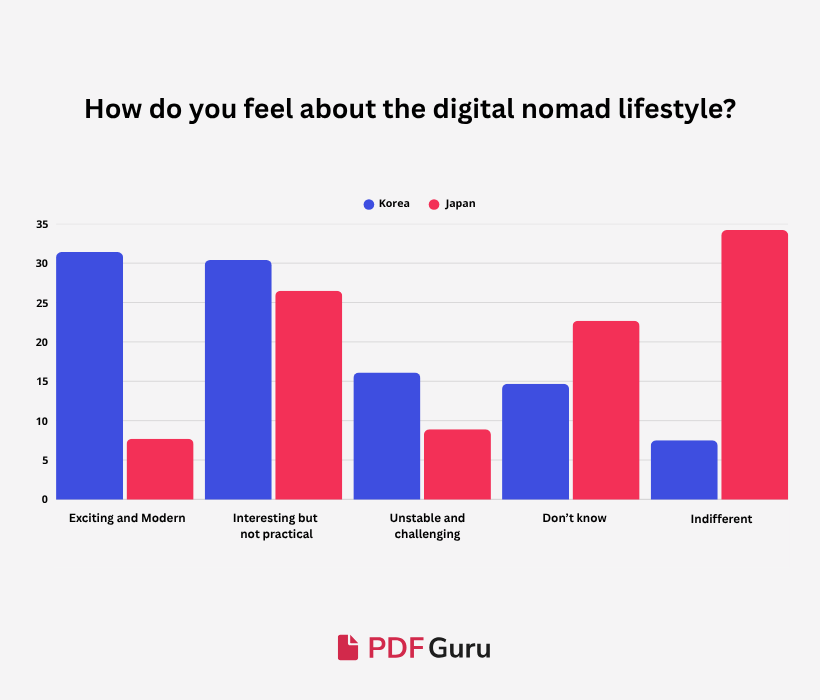
31.4% of Koreans rate the digital-nomad lifestyle as ‘exciting and modern,’ more than four times higher than Japan’s 7.7%. Conversely, only 7.5% of Koreans report being indifferent, compared with 34.2% of Japanese, highlighting much stronger interest and curiosity among Korean professionals. This enthusiastic response suggests that digital-nomad programs and services are likely to succeed in Korea’s market.
Q2: Nowadays, remote work tools and digital platforms have made it possible to work from anywhere. How do you think this has impacted Korean workplace culture?
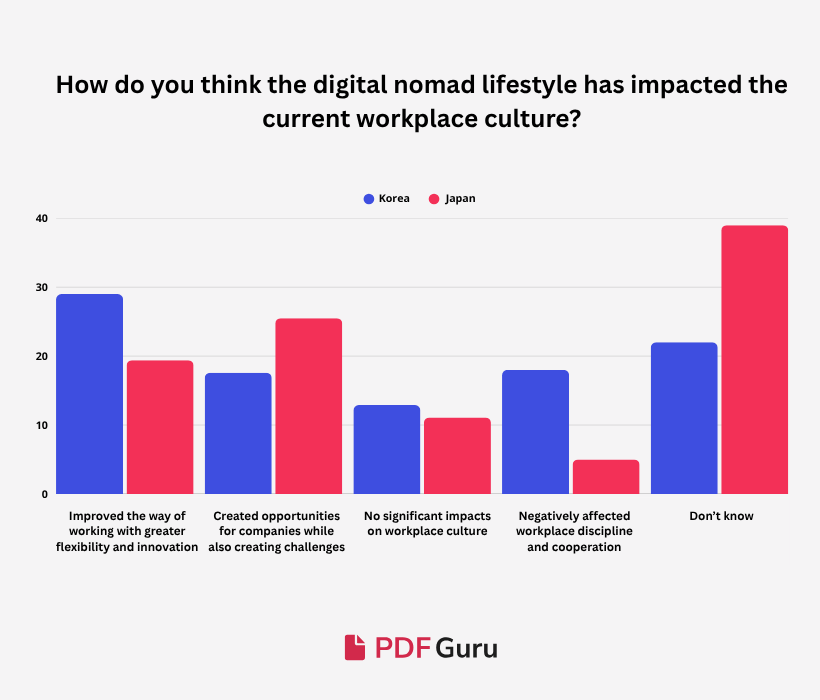
In Korea, 29% of respondents believe that remote work has enhanced flexibility and innovation. In comparison, 18% feel it has weakened discipline and teamwork – highlighting the coexistence of both strong positive and negative perceptions. By contrast, only 19.4% of Japanese cite increased flexibility and innovation, and just 5% report negative impacts, indicating a more moderate view.
These contrasting perspectives suggest Korean companies should prioritize change-management training and enhanced collaboration support to balance the benefits and drawbacks of remote work. These more polarized responses suggest that remote work is more widely experienced in Korea than Japan. With both positive and negative impacts being strongly felt, Korean companies may enter a more mature stage of remote work adoption, where more precise and structured policies are needed to support flexibility while addressing challenges around collaboration and discipline.
Q3: Digital tools have made it possible to work from anywhere. What do you think is the greatest advantage of this trend?
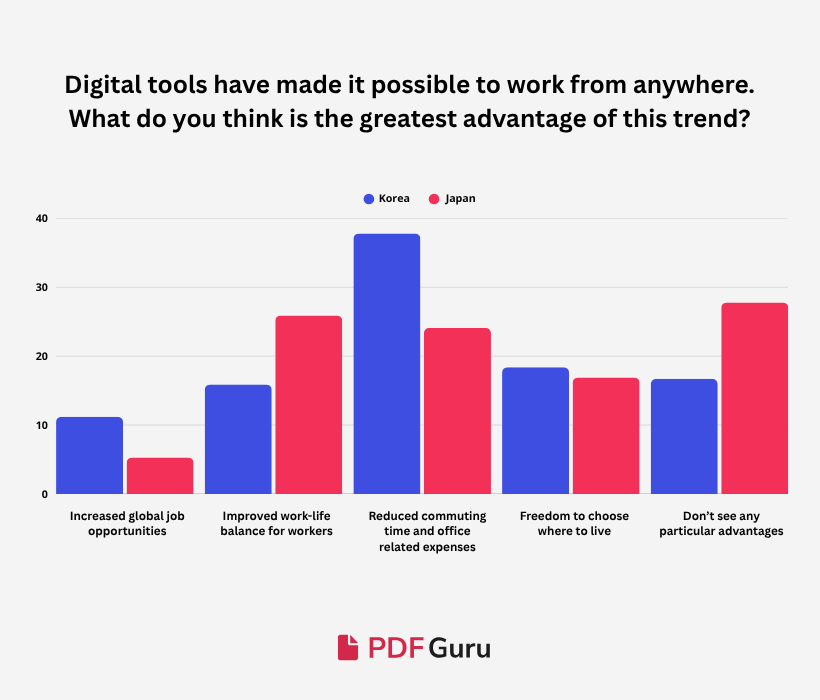
Korean respondents overwhelmingly point to cost savings on commuting time and office expenses (37.8%) as the top benefit, far above Japan’s 24.1%. This demonstrates that economic incentives are the primary driver of remote work adoption in Korea, especially when supported by practical digital tools like PDF OCR technology, which helps digitize and manage documents efficiently from anywhere.
However, in Japan, 27.8% answered that there was no particular advantage, followed by improved work–life balance (25.9%), indicating that Japanese workers prioritize quality of life gains over cost considerations.
Koreans also place twice as much emphasis on global opportunities (11.2% vs. 5.3%), signaling a stronger appetite for international career experiences.
Q4: Regarding the digital nomad lifestyle of working remotely while traveling using IT, what do you think is the greatest challenge of this lifestyle?
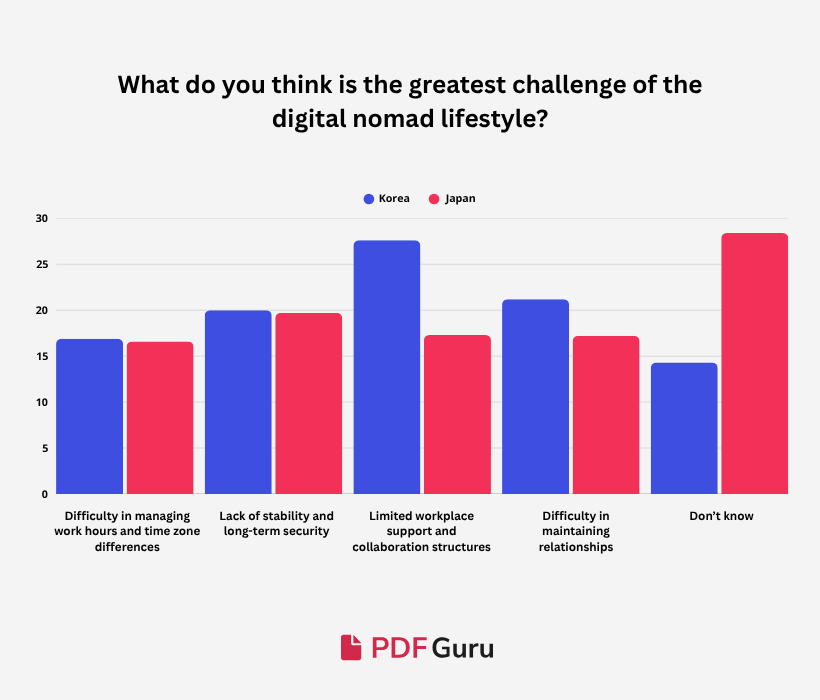
Koreans most frequently point to limits in support and collaboration (27.6%), followed by ‘difficulty in maintaining interpersonal relationships’ (21.2%) and ‘lack of stability and long-term security’ (20.0%). By contrast, the most common response in Japan (27.8%) was ‘don’t know,’ suggesting many Japanese respondents haven’t yet pinpointed the main obstacles. Korea’s clear identification of challenges underscores the urgency of building robust online collaboration environments and strengthening networking opportunities for remote workers.
Q5: With the spread of remote work, some people are considering living overseas in pursuit of a better work-life balance. What do you think is the biggest barrier for Korean workers considering this option?
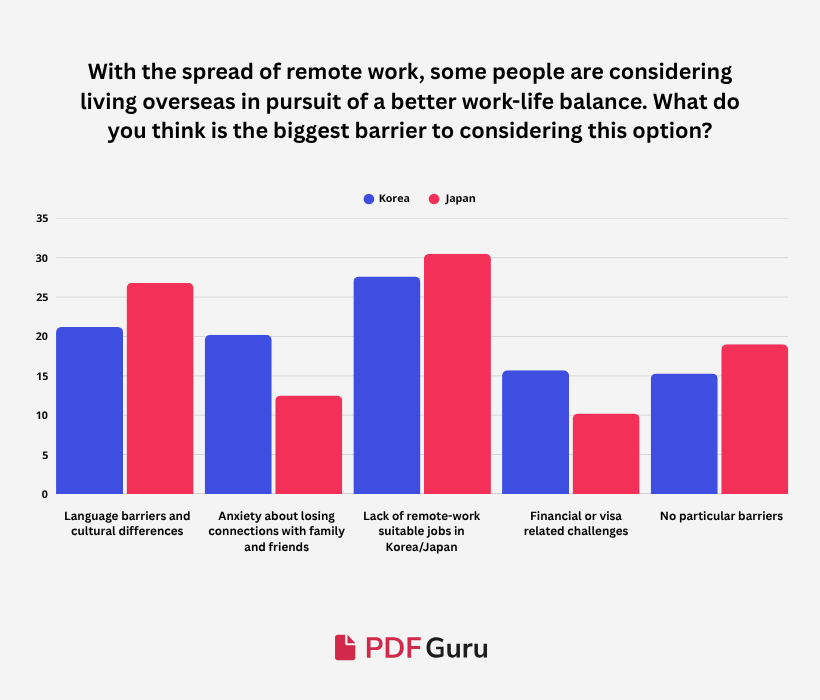
When contemplating overseas relocation for remote work, 27.6% of Koreans cite a ‘shortage of suitable domestic remote roles’ as the main barrier, similar to Japan’s 30.5%.
‘Language and cultural barriers’ are felt more strongly in Japan (26.8%) than in Korea (21.2%), whereas ‘Financial or visa issues’ concern more Koreans (15.7% vs. 10.2%). Notably, 18.6 % of Japanese report ‘no particular barrier,’ compared with just 15.3 % of Koreans, suggesting that Japanese workers perceive fewer hurdles to remote or overseas work or are less concerned due to lower overall interest.
Q6: Remote work and freelance jobs are becoming increasingly common worldwide. What do you think about Korea's adaptability to these changes?
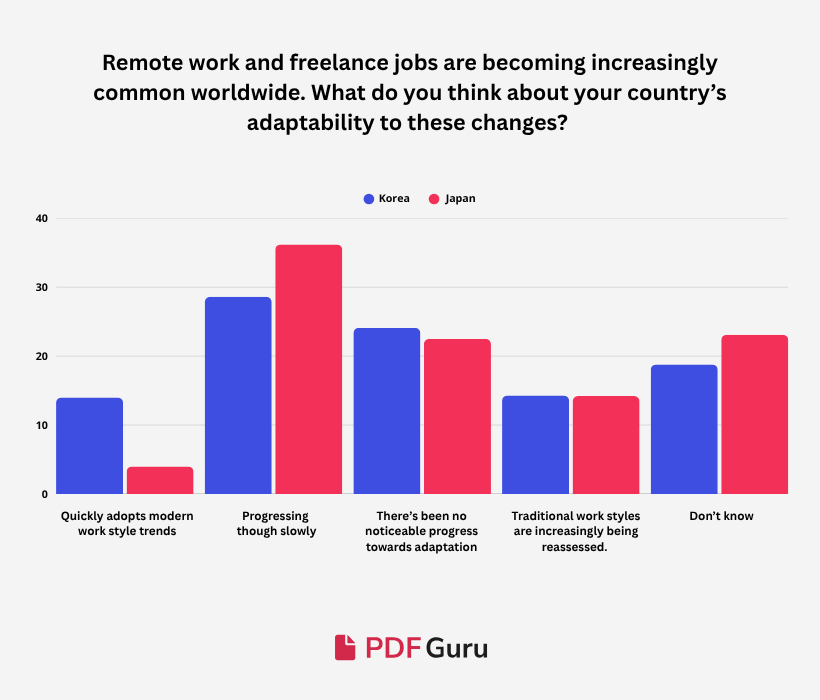
Only 28.6% of Koreans feel that adaptation to remote-work tools is ‘progressing, though slowly,’ compared with 36.2% of Japanese. However, 14% of Koreans say they are ‘adapting rapidly,’ versus just 4% of Japanese, demonstrating Korea’s greater eagerness to experiment. Responses of ‘no progress’ (24.1% vs. 22.5%) and ‘reassessing traditional methods’ (14.3% vs. 14.2%) are nearly identical across both countries, reflecting a mixed picture in which new trends and legacy practices coexist.
Q7: Have you ever had experience working as a digital nomad or freelancer?
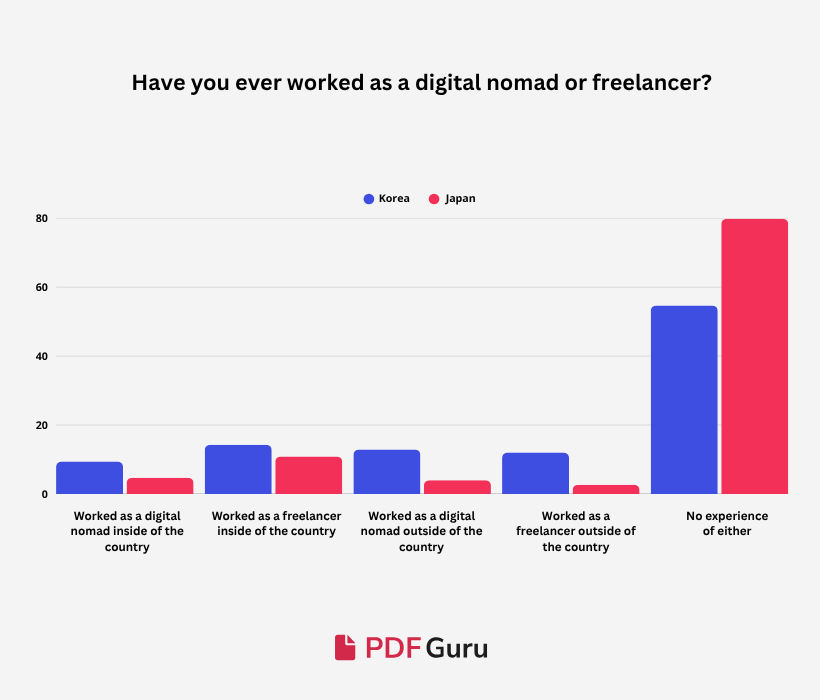
While 79.9 % of Japanese respondents report no such experience, only 54.7 % of Koreans do – meaning 20.1 % of Japanese have tried digital‑nomad or freelance work compared to 45.3 % of Koreans.
In particular, overseas digital‑nomad experience is reported by 12.9 % of Koreans versus 4.0 % of Japanese, overseas freelancing by 12 % versus 2.7 %, and domestic digital‑nomad experience is twice as common in Korea (9.4 % vs. 4.7 %), confirming that Korean professionals participate much more actively in location‑independent work.
These figures underscore Koreans’ far greater engagement in location‑independent work and further demonstrate the rapid growth of this trend in Korea – echoing the fact that over 30 % of Koreans view the digital‑nomad lifestyle as ‘exciting and modern.’
Conclusion
Korea is emerging as a bold front-runner in the global shift toward remote work and digital nomadism. While Japanese professionals remain cautious – many unsure about the advantages or obstacles – Korean workers are charting new territory with energy and optimism. Over 30 % of Korean respondents describe the digital-nomad lifestyle as ‘exciting and modern,’ and nearly half have already engaged in remote or freelance work, far surpassing Japanese participation. Korea’s drive is unmistakable: from embracing global opportunities to prioritizing cost savings and personal freedom, the appetite for change is strong.
But enthusiasm alone isn’t enough. Nearly 28 % of Korean respondents cite a lack of workplace support and collaboration structures as a major hurdle – signaling that the infrastructure to sustain this new lifestyle still lags behind the desire for it. To keep pace, Korean companies and service providers must take action: invest in better online collaboration tools, build mentorship networks, and offer location-independent services like automated PDF translation that can help remote professionals operate seamlessly across borders.
Japan’s more hesitant approach offers a telling contrast. Where Koreans are eager to adapt and explore, many Japanese workers remain on the sidelines – either unconvinced or constrained by legacy systems. For Korea, this represents not just a difference in attitude but a competitive advantage. With the proper support, Korea can lead the way in shaping Asia’s remote-work future – on its own terms.
Now is the moment to turn excitement into leadership. Korea has the talent, the tools, and the mindset. What’s needed next is action.
Respondent Attributes
Korean study
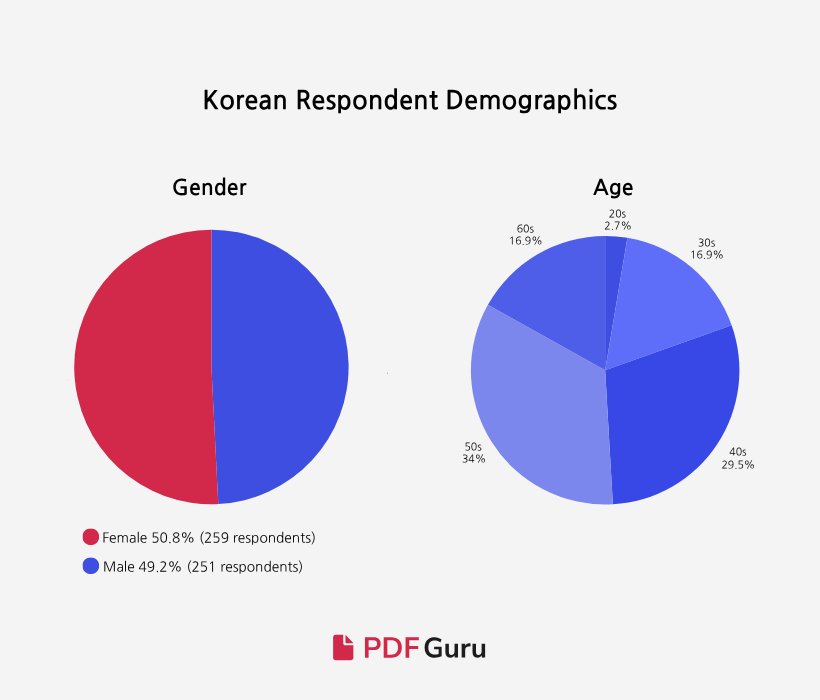
Japanese study
